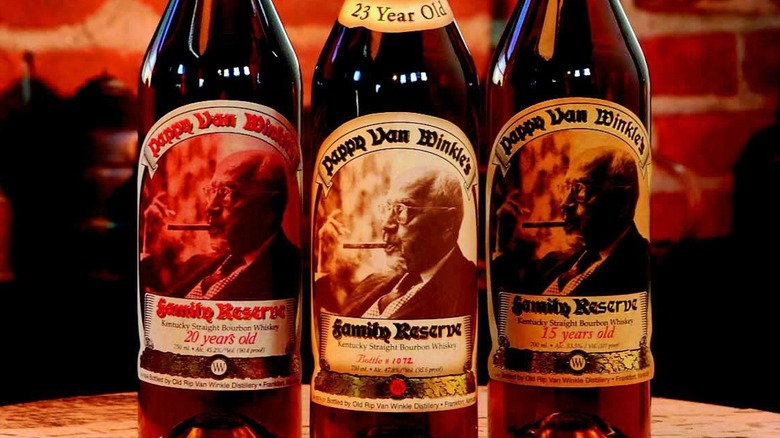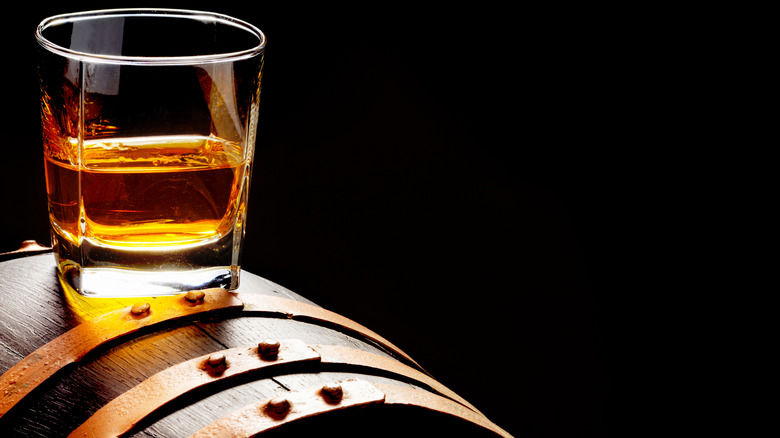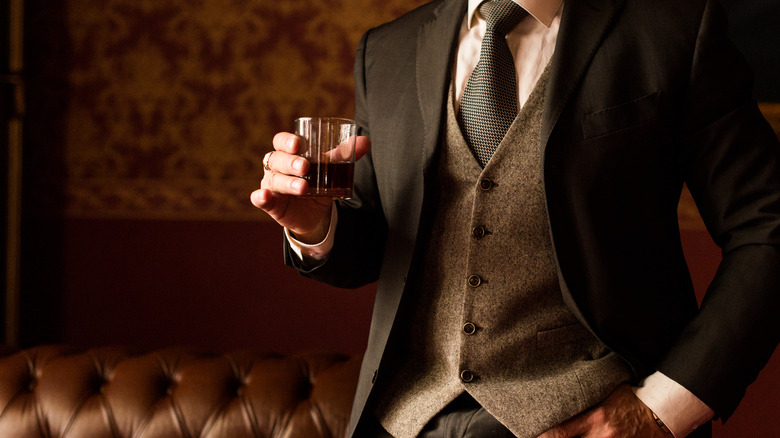What Is Pappy Van Winkle Bourbon And Why Is It So Expensive?
If you're a bourbon enthusiast, you may have a variety of bottles lying around. You probably have ones that you like to have on hand for everyday sipping or even mixing up a regular bourbon sour cocktail, as well as the precious bottles that are only brought out for special occasions (or really long days). And then there's the Sasquatch of the bourbon world: Pappy Van Winkle. Obtaining a bottle is akin to winning one of Wonka's Golden Tickets. Many bourbon fans have seen the brand's elusive bottles in pictures but few have actually witnessed its glory in the flesh, leaving some wondering if Pappy (as it's endearingly referred to) is nothing more than an urban bourbon legend.
It does indeed exist, but bottles are so rare and so exceedingly expensive that, even if you miraculously come across one, you are left to wonder if dipping into your retirement account to purchase it is a wise thing to do. The distillery that makes Pappy, Buffalo Trace, recommends that bottles retail for anywhere between $70 and $300, a price point that really isn't out of the question for a good bourbon. The problem is that the bottles are so rare and reputable that they are often sold for much more — we're talking thousands of dollars. Still, when spotted, Pappy bottles are scooped up without hesitation.
It's the kind of thing that happens when a bourbon has won more awards than it can count, is released in limited numbers, and is aged for at least 15 years before it's released.
Pappy's long aging process leads to limited supply
Like many wines, bourbon goes through an extended aging process before it's bottled. By law, a spirit labeled "bourbon" must be aged in oak barrels for at least two years. However, Pappy Van Winkle is aged for at least 15 years, which not only increases production costs, but also results in less bourbon to bottle, also because some of the booze naturally evaporates during this process (this is known as the "angel's share").
The limited number of bottles produced simply can't keep up with the demand so, naturally, collectors and enthusiasts clamor for the supply, and are willing to pay a lot more money than a normal manufacturer's suggested retail price (MSRP) for brands like Pappy Van Winkle. And then, many of those lucky enough to get their hands on a bottle will turn around and sell it themselves for even more money (this is called the secondary market).
In general, the longer a bourbon ages in the barrel, the better it is. After a decade and a half in oak (or longer), Pappy Van Winkle becomes incredibly smooth and complex, besting a bourbon that's been aged for a mere two years. This kind of craftsmanship attracts serious bourbon drinkers who are more than willing to shell out more money for it. Of course, the numerous awards that Pappy has won over the years speak for themselves, too.
Nothing increases value like a good reputation
In 1997, the Chicago Beverage Tasting Institute gave Pappy Van Winkle a glowing review and a rating of 99 out of 100. This happened at a time when bourbon had long since gone out of style in America and no one paid much attention to the Pappy brand. The rating, which was the highest a whiskey had ever been given, breathed new life into the company. Other tasting institutions took notice and awards came swarming in tenfold. Immediately, Pappy became the bourbon to get your hands on and its reputation hasn't wavered since. As word of mouth spread and celebrities like Anthony Bourdain went on record praising the bourbon, interest increased even more. Today, drinking bourbon is highly en vogue again and interest in it has skyrocketed.
Pappy Van Winkle actually sells two lines of bourbons. Old Rip Van Winkle is aged for 10, 12, or 13 years while Pappy Van Winkle is barreled for 15, 20, or 23 years with the oldest bottles sometimes selling for tens of thousands of dollars with an MSRP of about $300. This just shows how rare and desirable these bottles actually are. Whether or not the flavor is worth such money is totally subjective. The irony is, many people who are able to get a bottle of Pappy never even open it.



